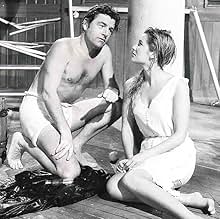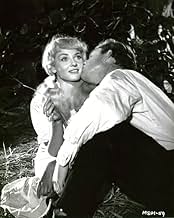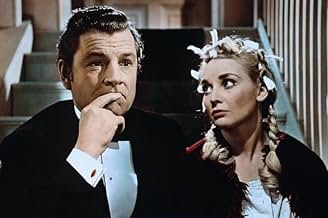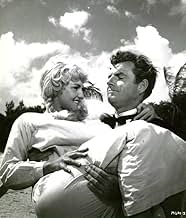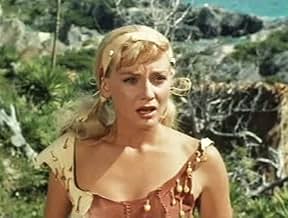VALUTAZIONE IMDb
7,1/10
2157
LA TUA VALUTAZIONE
Aggiungi una trama nella tua linguaIn 1905, Lord Henry Loam and his family and servants are shipwrecked on a deserted island where the survival of the fittest renders the rigid class system irrelevant.In 1905, Lord Henry Loam and his family and servants are shipwrecked on a deserted island where the survival of the fittest renders the rigid class system irrelevant.In 1905, Lord Henry Loam and his family and servants are shipwrecked on a deserted island where the survival of the fittest renders the rigid class system irrelevant.
- Regia
- Sceneggiatura
- Star
Jack Armstrong
- Guest at Ball
- (non citato nei titoli originali)
Recensioni in evidenza
In 1904 the Loam house is one of the most prodigious in all England. The head butler of the household is Crichton, who knows his place and is keen to keep the staff downstairs despite his labour-voting master's support of the absurd idea of all men as equal. On a cruise of the South Seas the family and Crichton become ship wrecked and the social standards that once controlled the families are no more and the castaways soon realise the value of a useful man.
I watched this by pure chance and, judging by the number of votes on imdb against this title, it appears that few other people have sought this film out. This is a retelling of J.M. Barrie's role reversal comedy and, although not without it's flaws, it is quite an enjoyable and thought provoking tale. The plot is simple in that the film looks at the class system in the UK and switches it in a situation where practicality and leadership qualities mean more than birthright. Sadly in the UK we have historically had a class system that has decided from birth who you will be when you grow up if you're father was a Lord then you shall be too and so forth. That is the situation here and it is amusing to it switched when the island has no such system and eventually everyone settles into one based on merit and ability rather than birthright.
The film has a few digs at the ruling classes in the final 20 minutes, showing them as pompous and perhaps not as honourable as they should be, meanwhile Crichton lives up to the character given him by the film's title. It is actually quite sad when the film returns to England because in this one man you do get to see the crushing and enslaving effect that the class system has on those born into the lower reaches of it. The comedy is rarely hilarious but is amusing throughout especially before the social switch occurs. It may feel a little old fashioned now but it is pretty light and enjoyable. If it does have a flaw it is that the jump between social status is sudden and not phased in slowly I know the film had limited time but it was a little hard to swallow all at once. Also, on return to England the film loses a little of it's sharpness and enjoyment value.
Moore is perfectly cast as the unflappable butler Crichton he is perfect but as someone who knows his place, but also convinces as someone whom is a born leader regardless of birth right. Parker plays Loam spot on and the support cast are all well played if a little unmemorable in the odd spot.
Overall this is a quaint little film that makes a very good point. Although we are a classless society by comparison to the events in this film, class and birthright still play a big part in deciding what you'll become in later life in the UK. This is an amusing film with still a thoughtful message.
I watched this by pure chance and, judging by the number of votes on imdb against this title, it appears that few other people have sought this film out. This is a retelling of J.M. Barrie's role reversal comedy and, although not without it's flaws, it is quite an enjoyable and thought provoking tale. The plot is simple in that the film looks at the class system in the UK and switches it in a situation where practicality and leadership qualities mean more than birthright. Sadly in the UK we have historically had a class system that has decided from birth who you will be when you grow up if you're father was a Lord then you shall be too and so forth. That is the situation here and it is amusing to it switched when the island has no such system and eventually everyone settles into one based on merit and ability rather than birthright.
The film has a few digs at the ruling classes in the final 20 minutes, showing them as pompous and perhaps not as honourable as they should be, meanwhile Crichton lives up to the character given him by the film's title. It is actually quite sad when the film returns to England because in this one man you do get to see the crushing and enslaving effect that the class system has on those born into the lower reaches of it. The comedy is rarely hilarious but is amusing throughout especially before the social switch occurs. It may feel a little old fashioned now but it is pretty light and enjoyable. If it does have a flaw it is that the jump between social status is sudden and not phased in slowly I know the film had limited time but it was a little hard to swallow all at once. Also, on return to England the film loses a little of it's sharpness and enjoyment value.
Moore is perfectly cast as the unflappable butler Crichton he is perfect but as someone who knows his place, but also convinces as someone whom is a born leader regardless of birth right. Parker plays Loam spot on and the support cast are all well played if a little unmemorable in the odd spot.
Overall this is a quaint little film that makes a very good point. Although we are a classless society by comparison to the events in this film, class and birthright still play a big part in deciding what you'll become in later life in the UK. This is an amusing film with still a thoughtful message.
J.M. Barrie's 1902 play, THE ADMIRABLE CRICHTON, illogically and crudely renamed for its U.S. release PARADISE LAGOON in reference to the setting of Barrie's transformative second and third (of four) acts, treats such universal themes of natural leadership that it may well be one of the most successfully copied - dare one say plagiarized? - plots extant. It has been speculated that Barrie himself filched the idea of a group of privileged persons stranded on a deserted island from an 1896 German play, ROBINSON'S EILAND, where a secretary emerges as the leader.
In 1947, French playwright Andre Roussin (claiming to trace his story from a 1921 Catalan play, NEVERTHELESS CIVILIZED) reduced Barrie's assortment of shipwrecked privileged Britons and their servants to a mere handful to focus on one romantic triangle but retained Barrie's essential structure for his THE LITTLE HUT which proved almost as successful (and as frequently filmed) as the Barrie classic on both sides of the Atlantic. From 1964 to 1967, CBS Television in the U.S. mined essentially the same territory (if decidedly Americanized - transmuting a failed South Seas cruise to a disastrous "three hour cruise" out of Hawaii and reducing the sexual competition to favor the status/qualification competition humor which could be infinitely stretched out) with a situation comedy called GILLIGAN'S ISLAND.
While this 1957 (British) Columbia Pictures adaptation of the Barrie play inexplicably softens the overt sexual competition on the island for Kenneth More's Crichton's attentions between "name" performer Sally Ann Howes' Lady Mary and second billed Diane Cilento as the lower class "Tweenie" (a maid in training), it admirably presents the essentials of Barrie's play with the "perfect" British butler holding his "master's" household together both in England and on an isolated South Sea isle - while exploring how different qualities may bring different people to the fore under different circumstances.
The always perfect foil Cecil Parker as Lord Loam is excellent as the titular head of the British household who becomes a better man as he naturally falls into Crichton's role on the island and suffers great pangs when "normality" is restored on their return home. As uniformly solid as the entire cast is however, for many the standout performance will be Martita Hunt's (Lady Bracknell influenced) Lady Brocklehurst - a clear homage from Barrie to Oscar Wilde's greatest play, the 1895 IMPORTANCE OF BEING EARNEST. Lady Brocklehurst, protecting her "family name" before allowing her son to announce his engagement to Lady Mary, is determined to find out what *really* happened on the island. Her questioning - and the comic obfuscation which parries it - is right up there with Lady Bracknell's inquisition of Earnest prior to his engagement to Cecily in Wilde.
The final curtain of the film nicely preserves the tension for the audience Barrie wished as to how Crichton will actually wind up. It is said that Barrie himself toyed with an alternate ending with Crichton ending up in a more "romantic" liaison. Barrie came to the conclusion however, that his audience "would not stand it." It's hard to say today - either way it's a warm, bittersweet finish fully worthy of the journey getting there.
It is also worth noting that the recent British DVD reissue of the film restores Kenneth More to the cover - the previously most available VHS release mistakenly boasted the handsomer supporting player (as the author Ernest Wooley) Gerald Harper on its cover as the "admirable Crichton" - at the moment a rescuing ship is sited. That "pan and scan" Columbia/Tristar VHS Home Video release also only offered the U.S. "PARADISE LAGOON" release, even though clearly labeled THE ADMIRABLE CRICHTON (the better known original title).
Either way, it's well worth a look - and inexcusable that this classic isn't more readily available for broad viewing today.
In 1947, French playwright Andre Roussin (claiming to trace his story from a 1921 Catalan play, NEVERTHELESS CIVILIZED) reduced Barrie's assortment of shipwrecked privileged Britons and their servants to a mere handful to focus on one romantic triangle but retained Barrie's essential structure for his THE LITTLE HUT which proved almost as successful (and as frequently filmed) as the Barrie classic on both sides of the Atlantic. From 1964 to 1967, CBS Television in the U.S. mined essentially the same territory (if decidedly Americanized - transmuting a failed South Seas cruise to a disastrous "three hour cruise" out of Hawaii and reducing the sexual competition to favor the status/qualification competition humor which could be infinitely stretched out) with a situation comedy called GILLIGAN'S ISLAND.
While this 1957 (British) Columbia Pictures adaptation of the Barrie play inexplicably softens the overt sexual competition on the island for Kenneth More's Crichton's attentions between "name" performer Sally Ann Howes' Lady Mary and second billed Diane Cilento as the lower class "Tweenie" (a maid in training), it admirably presents the essentials of Barrie's play with the "perfect" British butler holding his "master's" household together both in England and on an isolated South Sea isle - while exploring how different qualities may bring different people to the fore under different circumstances.
The always perfect foil Cecil Parker as Lord Loam is excellent as the titular head of the British household who becomes a better man as he naturally falls into Crichton's role on the island and suffers great pangs when "normality" is restored on their return home. As uniformly solid as the entire cast is however, for many the standout performance will be Martita Hunt's (Lady Bracknell influenced) Lady Brocklehurst - a clear homage from Barrie to Oscar Wilde's greatest play, the 1895 IMPORTANCE OF BEING EARNEST. Lady Brocklehurst, protecting her "family name" before allowing her son to announce his engagement to Lady Mary, is determined to find out what *really* happened on the island. Her questioning - and the comic obfuscation which parries it - is right up there with Lady Bracknell's inquisition of Earnest prior to his engagement to Cecily in Wilde.
The final curtain of the film nicely preserves the tension for the audience Barrie wished as to how Crichton will actually wind up. It is said that Barrie himself toyed with an alternate ending with Crichton ending up in a more "romantic" liaison. Barrie came to the conclusion however, that his audience "would not stand it." It's hard to say today - either way it's a warm, bittersweet finish fully worthy of the journey getting there.
It is also worth noting that the recent British DVD reissue of the film restores Kenneth More to the cover - the previously most available VHS release mistakenly boasted the handsomer supporting player (as the author Ernest Wooley) Gerald Harper on its cover as the "admirable Crichton" - at the moment a rescuing ship is sited. That "pan and scan" Columbia/Tristar VHS Home Video release also only offered the U.S. "PARADISE LAGOON" release, even though clearly labeled THE ADMIRABLE CRICHTON (the better known original title).
Either way, it's well worth a look - and inexcusable that this classic isn't more readily available for broad viewing today.
The 1957 version of the classic J.M. Barrie play -- yes, he wrote something besides Peter Pan -- benefits from its opening up, with a lot of shooting in Bermuda. Kenneth More is the butler who, when the yacht sinks, becomes the leader of the aristos by dint of his understanding that work must be done and how to do it; by the time they are unwillingly rescued, he's got the island organized and built up like a Buster Keaton set.
Cecil Parker plays his fuddy-duddy upper-class twit, but here clearly takes pleasure in playing against type in the scenes where he's Kenneth More's manservant. I thought it a bit odd that Diane Cilento played 'Tweenie' and Sally Ann Howes Parker's daughter; were I casting it, I would have switched those roles. Both ladies acquit themselves well. Martitia Hunt has a great small role as Lady Bracknell..... I mean Lady Brocklehurst.
Cecil Parker plays his fuddy-duddy upper-class twit, but here clearly takes pleasure in playing against type in the scenes where he's Kenneth More's manservant. I thought it a bit odd that Diane Cilento played 'Tweenie' and Sally Ann Howes Parker's daughter; were I casting it, I would have switched those roles. Both ladies acquit themselves well. Martitia Hunt has a great small role as Lady Bracknell..... I mean Lady Brocklehurst.
PARADISE ISLAND (UK title THE ADMIRABLE CRICHTON) is a Technicolor version of the old Barrie classic. Filmed by Rank at the height of its studio period, it stars Kenneth More in the eponymous role as the butler who manages to adapt to life on a desert island. More isn't the most obvious personality to play a butler - his breezy screen persona projected a more louche image than that expected of a gentleman in service - but he makes a good stab at the role. He is complemented in the film by Cecil Parker as his employer. A much underrated actor, Parker was extremely good at playing harassed males of a certain vintage - outwardly authoritative yet inwardly insecure. In this production it's clear that he cannot manage without Crichton. Director Lewis Gilbert handles familiar material with élan, making this a satisfying piece of entertainment.
The Admirable Crichton is an adaptation of J.M. Barrie's role reversal play, taking pot shots at the British class system and starring Kenneth More in the title role, it's something of a little treasure. Basically the plot sees Butler supreme Crichton become the governor of the desert island that he, and the toff family he serves, have been shipwrecked upon. The point being that these rich toffs, tho basically good people, are ill equipped to fend for themselves in the cold hard world. Crichton of course is well prepared for this new life forced upon them. He can cook, swim, catch fish, even start a fire, which none of the rich folk are capable of doing! We are of course asked to suspend a modicum of disbelief, I mean there are four sexy babes on this island and all of them start to fancy Crichton! Yes it's that sort of film folks. But it's a real well told story that is acted with fine skill, particularly from More and the infectious Cecil Parker as Lord Loam, whilst red blooded men such as myself get the benefit of some rather pretty looking ladies, especially Sally Ann Howes as Lady Mary. The ending is never really in doubt, but you know what, in this type of picture I didn't want it any other way. Highly recommended escapism. 7/10
Lo sapevi?
- QuizFor much of his role as Bill Crichton, Kenneth More was filmed from the waist up to hide the fact that he was wearing shorts with his dinner-jacket because of the heat during filming.
- BlooperWhen land is first sighted, Tweeny has only one arm on the oar when the binoculars are passed to Crichton. In the next shot, when Crichton is looking through the binoculars, she has both arms on the oar.
- Citazioni
Lady Brocklehurst: George... Listen when anyone begins to answer with "The fact is... "
Brocklehurst: But why, mother?
Lady Brocklehurst: Because that is, usually, the beginning of a lie.
- Curiosità sui creditiOpening credits prologue: LOAM HALL ENGLAND 1905
- ConnessioniFeatured in Talkies: Remembering Kenneth More: Part One (2019)
- Colonne sonoreMolly Malone
(uncredited)
Generally regarded as a traditional song, but lyrics are sometimes attributed to James Yorkston with music arranged by Edmund Forman
Sung by Cecil Parker (Lord Loam) on the island
I più visti
Accedi per valutare e creare un elenco di titoli salvati per ottenere consigli personalizzati
Dettagli
- Data di uscita
- Paese di origine
- Lingua
- Celebre anche come
- Paradise Lagoon
- Luoghi delle riprese
- Bermuda(desert island - Stonehole Bay, Chaplin Bay and Jobson's Cove)
- Azienda produttrice
- Vedi altri crediti dell’azienda su IMDbPro
- Tempo di esecuzione1 ora 34 minuti
Contribuisci a questa pagina
Suggerisci una modifica o aggiungi i contenuti mancanti

Divario superiore
By what name was L'incomparabile Crichton (1957) officially released in India in English?
Rispondi



